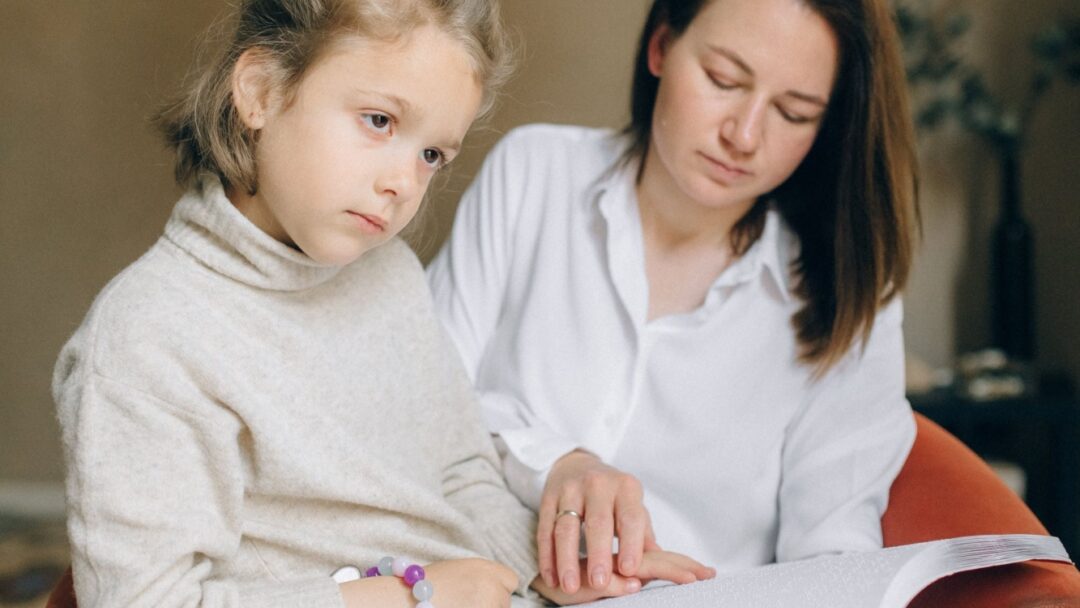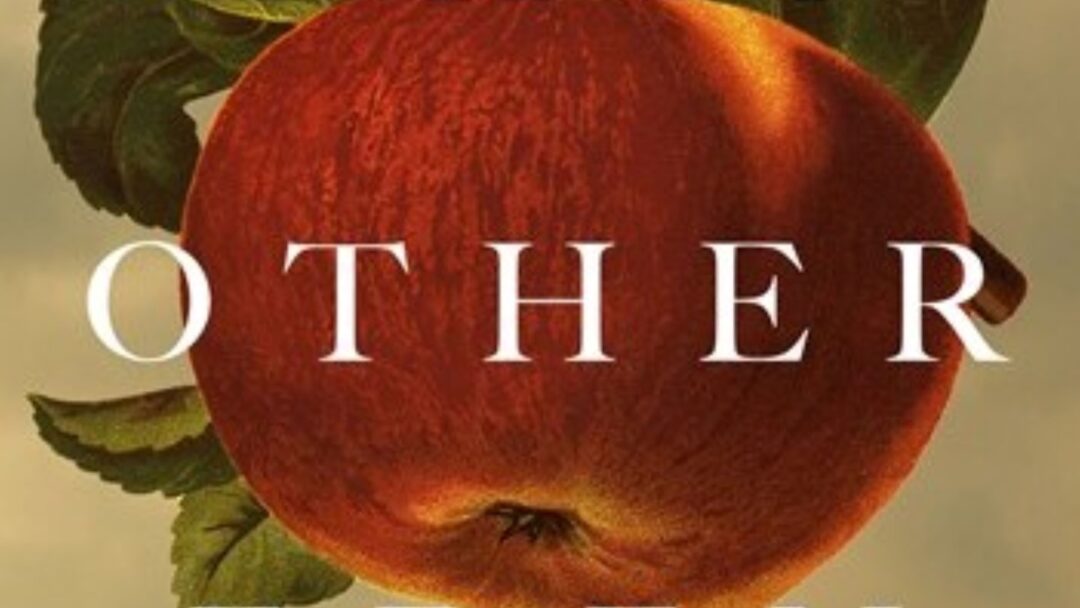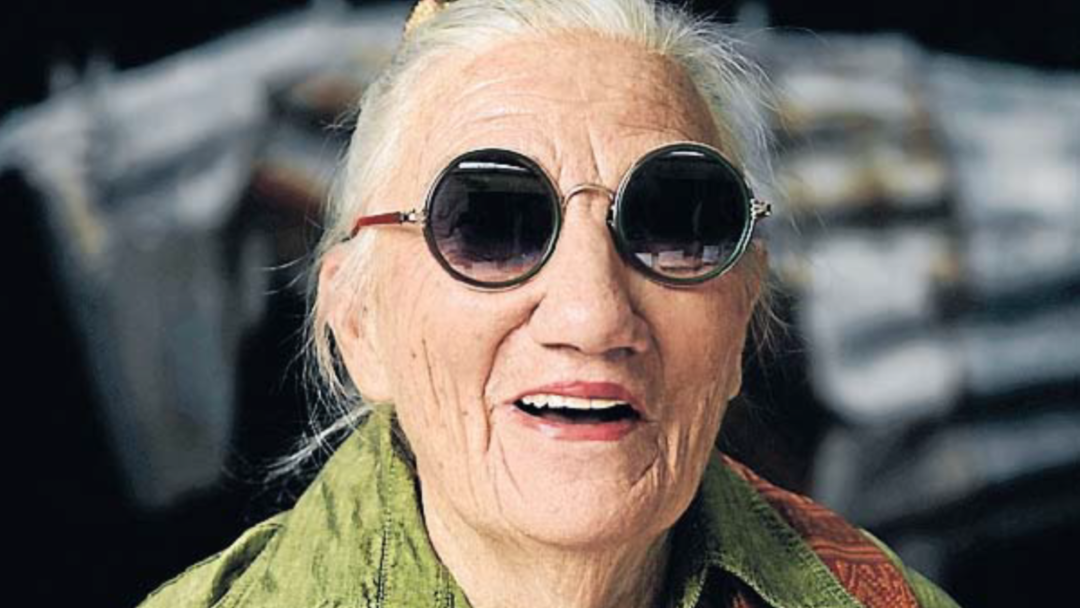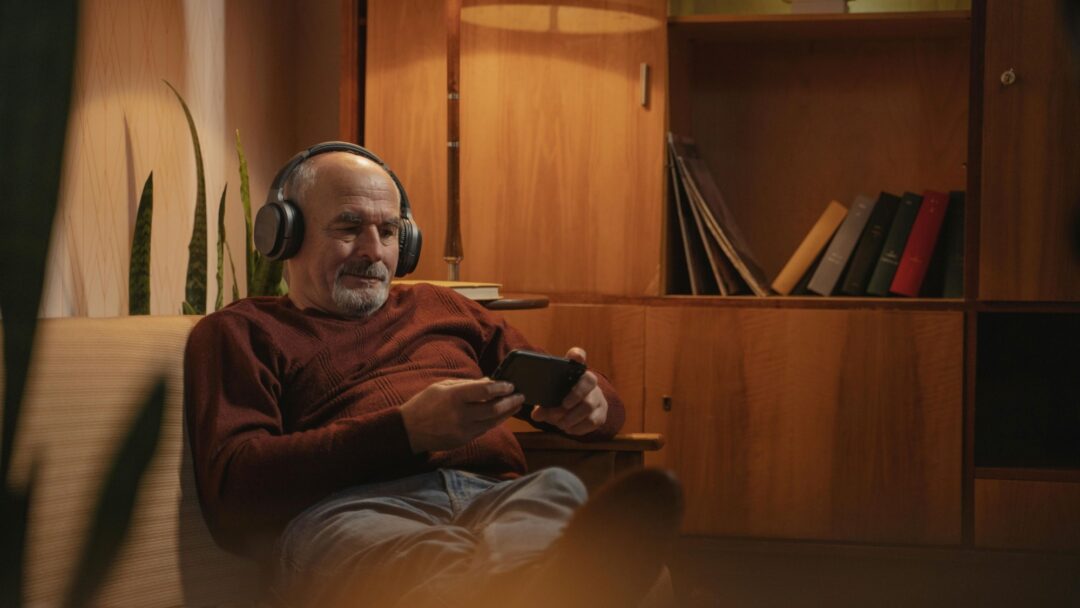Audio
This Other Eden... and some other readin'!
Hear This by
Vision Australia3 seasons
7 June 2024
29 mins
Reader Recommends and crime fiction from the Vision Australia library for blind and low vision people.

Hear This is a weekly presentation from the Vision Australia Library service, bringing you up to date with publications on offer for people with blindness or low vision - including spoken excerpts.
Host Frances Keyland also presents reviews and Reader Recommends.
This episode presents some Reader Recommends and crime fiction.
00:50UU
Take a look.
01:04S1
Hello and welcome to Hear This. I'm Frances Keyland and you're listening to the Vision Australia library program here on Vision Australia Radio. Today we have a great reader recommended title, as well as some books by Australian crime writers, and a special anniversary of a book that came out 70 years ago. I do hope you enjoy the show.
Let's start off today with a reader recommended. It is This Other Eden by Paul Harding. And this was recommended by Bob. And he said, this one is poetic, immersive, and an outstanding work of literary fiction. As you would expect from a Harvard teacher and Pulitzer Prize winner. I found it to be most moving. Thank you Bob. This Other Eden is set at the beginning of the 20th century and inspired by historical events. It tells a story of Apple Island, an enclave off the coast of the United States where waves of castaways in flight from society and its judgment have landed and built a home.
Benjamin Honey, American Bantu, Igbo born, enslaved, freed or fled. At 15, aspiring orchardist arrived on the island with his Irish wife, Patience, and discovered they could make a life together. They're more than a century later, the Honey's descendants remain with an eccentric, diverse band of neighbors. Then comes the intrusion of civilization officials determined to cleanse the island, and a missionary school teacher selects one light skinned boy to save. The rest will succumb to the authorities, institutions, or cast themselves on the waters in a new Noah's Ark. Let's hear a sample of This Other Eden by Paul Harding. It's narrated by Edoardo Ballerini.
02:57S2
Benjamin Honey American Bantu, Igbo born, enslaved, freed or fled at 15 only he ever knew. Ship's carpenter, aspiring orchardist. Arrived on the island with his wife Patience, née Rafferty, Galway girl in 1793. He brought his bag of tools, gifts from a grateful captain he had saved from drowning or plunder from a ship in which he had mutinied and murdered the captain, depending on who said, and a watertight wooden box containing 12 jute pouches. Each pouch held seeds for a different variety of apple. Honey collected the seeds during his years as a field worker and later as a sailor. He remembered being in an orchard as a child, although not where or when with his mother, or with a woman whose face over the years had become what he pictured as his mother's, and he remembered the fragrance of the trees and their fruit. The memory became a vision of the garden to which he meant to return. No mystery. It was Eden.
Years passed and he added seeds to his collection. He recited the names at night before he slept. Ashmead's. Kernel. Flower of Kent. Duchess of Oldenburg and Warner's King. Ballyfatten. Cat's head. After Benjamin and Patience honey arrived on the island hardly 300ft across a channel from the mainland. Just under 42 acres, 1200ft across east to west, and 1500ft long north to south. Uninhabited, then the only human trace and abandoned Penobscot shell berm. And after they had settled themselves, he planted his apple seeds. Not a seed grew. Benjamin was so infuriated by his ignorance that over the next year, he crossed to the mainland whenever he could spare some time, and sought out orchards and their owners in the countryside beyond the village of 6 or 7 houses called Foxton, that stood directly across the channel from the island, and traded his carpentry skills for seeds and advice about how they grew and how to cultivate the trees in their fruit.
04:59S1
And that was this other Eden by Paul Harding. Paul is [spells author's name]. And that book is not too long. Goes for six hours and ten minutes. Paul Harding was born in 1967, an American musician and writer best known for his debut novel The Tinkers from 2009, which won the 2010 Pulitzer Prize. This Other Eden, in his third, is his third novel and was short listed for the 2023 Booker Prize and the 2023 National Book Award for fiction. I guess in the United States. There there is a review, from the 7th of February 2023, in The Guardian, in which it is said that the novel impresses time and again because of the depth of Harding's sentences, their breathless, angelic light, and says: A tale of racism on an isolated island off the coast of Maine finds that this Pulitzer Prize winning author's gifts have found their fullest expression.
Now to Australia's group Sisters in Crime. Sisters in Crime Australia Inc has been celebrating women's crime writing since 1991. Sisters in crime was inspired by the American organization of the same name, which was founded in 1986 by Sara Paretsky, a creator of Chicago P.I. private investigator V.I. Warshawski. It's not just about the writing. The organization brings together for entertainment and interest women crime writers, screenwriters, producers, booksellers, publishers, lawyers, judges, police, forensic specialists, librarians, academics and critics, and readers and reviewers. The group has strong membership, with chapters in Melbourne, Perth and Brisbane, and events are open to members of the public, and also men or brothers in law are welcome to attend events and join.
And if you think you've got a crime story in you, sisters in Crime have an annual crime short story competition. It's called the Scarlet Stiletto. It's open to women only. It is attracted nearly 3000 stories since it began in 1994, and the overall winner receives a cash prize plus a coveted trophy, which is a scarlet stiletto shoe with a steel stiletto heel plunging into a perspex mount. Closing date for the award is always the 31st of August each year. An entry fee is $20 for sister in crime members, or $25 if you're not a member of Sisters in Crime, and the prize money is usually around $10,000. If you've got a convoluted plot that might need a bit of a length of time to explore, with this award, the maximum length is 5000 words only. So keep it to 5000 words and enter if you would like to.
You can find all the information on the Sisters in Crime. Augereau. Sisters in Crime, one word Augereau and their website. You can just explore that and find out how to enter. Sisters in crime host many events with libraries, bookshops, literary literary festivals and if you're in Melbourne, the Sun Bookshop in Yarraville runs the bookstall at its regular Melbourne events called XI Kilda a one day crime spree coming up on July the 5th here in Victoria at 8:00 pm, there is an event, twisted plots with a cracking pace, breathing new life into rural noir, rural noir crime fiction, set everywhere from dry and dusty farming communities to sleepy seaside towns, has become a global publishing sensation.
Breathing new life into this established, sometimes tired genre are three Australian authors Vikki Wakefield, Fiona Low and Christine Gregory. They'll be thrashing through the issues with award winning author Margaret Hickey. This event will be held at the Rising Sun Hotel in South Melbourne. And the event costs $10. But if you'd like to include a dinner, it's $62, but you can just turn up for the talking. So that's July the 5th at 8:00 pm at the Rising Sun Hotel in South Melbourne in Victoria. The three authors we mentioned, we have books by two of them in the collection.
Let's start off with Vicky Field and we have her novel in the collection. Its title is To the River. When a fire in a remote caravan community kills nine people, including 17 year old Sabine Kelly's mother and sister. Sabine confesses to the murders shortly after she escapes custody and disappears. Recently made redundant from marriage, motherhood and her career, journalist Rachel Wiedemann has long suspected Sabine made her way back to the river. Now, 12 years after the caravan murders, she has the time and the tenacity to corner a fugitive and land the story of the year. Let's hear a sample of To the River by Vikki Wakefield. It's narrated by Cassie Withoos.
10:18S3
The cliffs at Shallow Bend are painted red and gold. The willows sweep the water with loose limbs as the river brings Sabine home. It's the last day of summer and change is coming. Time of slowly on the river. She hasn't seen her grandfather since late winter, but it seems like longer. Pop keeps an eye out for her, but his hearing isn't what it used to be. And he sleeps like the dead. Sabine has mastered the art of cutting the houseboats engine, reading The Current her last visit. He didn't know she was there until she had steeped a pot of tea and set the mug in his hand. He won't call her. Won't pick up if she calls. It's for her protection, he says. She thinks it has more to do with his distrust of technology. I have that in common.
Pop believes microwave ovens can record conversations. He blames his cancer on the one she gave him. Cancer has gone, and he stashed the microwave in the shed, its inner parts buried in the midden for good measure. He eats his meals cold, straight from the can. Blue sits in his usual spot at the helm. He turns his back on the land and stares wistfully at the water, as if to say, this can't be right. He's more seal than dog, won't eat red meat, only fish and occasionally chicken. Kibble is an abomination. Sabine often catches him nosing biscuits over the side of the houseboat for the carp. She looks around. Pops tinny rocks gently in her wake, and the orange flag tied to the jetty post reassures her the area is clear of surveillance.
The houseboat drifts into a space near the opening of the backwater. A soft bump and the rear swings around. Blue loses his balance, his claws scrabbling on the deck. Sabine laughs and blue, indignant, barks once she shushes him with one finger. His bark sets off the kennel dogs across the river, and for the first time he shows interest in going ashore. Leave it, Sabine says softly, and he settles on his mat.
12:24S1
And that was To the River by Vicky Wakefield. And Vicky is spelled [spells author's name]. And that book goes for 9.5 hours. If you enjoy that book, if you borrow it. There's also All I Ever Wanted, Friday Brown, In Between Days and After You Were Gone, all by Vicky Wakefield. I'm looking at the Text publishing website, which is just simply text publishing Commou. Vicky Wakefield writes fiction for adults and young adults. Her novels have been shortlisted for numerous awards. After You Were Gone, a psychological thriller, was her first novel for adults and was published in 2022 to much acclaim. To the River is her second psychological thriller, and Vicky lives in Adelaide, South Australia, and it's great to have her books in the collection.
The next novelist is Fiona Lowe, and the book we have a sample of is Just an Ordinary Family. Every family has its secrets. Alice Hunter is smarting from the raw deal life has thrown her way. Suddenly, single, jobless and forced to move home to her parents tiny seaside town. And now she faces an uncomfortable truth she wants her twin sister Libby's enviable life. Libby's closest friend, Jess Derrick, has been around the Hunter family for so long, she might as well be blood. She's always considered herself a sister closer to Libby than Alice ever could be. Libby Hunter has all of life's boxes ticked, a prominent small town doctor, gorgeous husband, and two young daughters. But when she is betrayed by those she loves most, it reveals how tenuous her world is. For Karen Hunter, her children are a double edged sword of pain and pride. She's always tried to guide her girls through life's pitfalls. But how do you protect your children when they're adults? As the family implodes, the fallout for these four women will be inescapable.
Let's hear a sample of Just an Ordinary Family by Fiona Low. It's narrated by Rebecca McCauley.
14:37S4
Alice Hunter sneezed into her shoulder three times, then shivered a sure sign she was sick. These were the moments when she missed being a kid. When she was growing up, her mother had strict rules about illness, and one of Karen's favorite sayings had been, if you can stand and argue with me about going to school, you're well enough to go. Many times, Alice had reluctantly stuffed her bag with books and stomped out the door. But whenever Alice had spiked a temperature, Karen had always tucked her up in bed and fed her chicken soup. Table seven, Jake, the chef and owner of the restaurant, slid hot plates onto the pass and frowned at her.
15:24S5
You look like crap. Don't give whatever it is to the customers.
15:28S4
Gee, thanks. And here I was thinking you might make me some immune boosting soup. You're lucky I'm not making you work a double shift. Not for the first time, Alice wondered how the life she'd envisioned for herself had come to this. Despite her best laid plans, she was back in Kearney Bay, living in her childhood home and working for casual jobs. Waitressing during the summer. Crush was the worst of them. Alice carried the pasta bowl and the fish plate to table seven, offered pepper and parmesan cheese and smiled against aching teeth. Great. She probably had sinusitis on top of the cold. She considered dropping into the medical center on the way home in case Libby could squeeze her in for an appointment. Then again, Libby's patience had to be halfway to septic shock before she prescribed antibiotics. Her twin would recommend saline nasal spray, steam inhalations, and a review in three days. We need another bottle of water. The woman at table seven gave Alice the empty bottle. Absolutely. I'll be right back.
16:38S1
And that was a sample of Just an Ordinary Family by Fiona Low. Fiona is [spells name], um. Fiona Low has written a few books. The accident is her latest one. Fiona Low has been a midwife, sexual health counselor, counsellor and a family support worker. An ideal career for an author who writes novels about family and relationships. So this is from Fiona Low. Com Fiona Low com. Her books are popular in the USA as well. She's been a recipient of the prestigious um USA Rita Award and the Australian Ruby Award. And Fiona's books are set in small country towns and feature real people facing tough choices and explores how family ties impact on the decisions on their decisions.
Now we don't have any books by Christine Gregory, who is the third author appearing at Twisted Plots with a cracking pace. On July the 5th. But we do have a book by Jane Sullivan, who is also appearing at a later date at the Rising Sun Hotel for Sisters in Crime on on July the 26th at 8 p.m. and Jane Sullivan, we have one of her books in the library collection, Little People. When Marianne, an impoverished governess, rescues a child from the Yarra River, she sets in motion a train of events that she could never have foreseen. It is not a child she is saved, but General Tom Thumb, star of a celebrated troupe of midgets on their 1870 tour of Australia. So it is historical fiction, from the enchanting Queen of beauty Lavinia Stratten to the brilliant pianist Franz Richardson, it seems that Marianne has fallen in among friends. She soon discovers, however, that relationships within the troupe and its entourage are far from harmonious.
Jealousy is rife, and there are secrets aplenty. Even Marianne has one of her own. Relief gradually turns to fear as she realizes that she may be a pawn in a more dangerous game than she imagined. Let's hear a sample of Little People by Jane Sullivan. It's narrated by Carol Baker.
18:55S6
One day she will ask me the inevitable question. There is much to tell, and I am not certain how to tell it. At least I know where to begin. I will remind her that I was young and had always been told that wanting was nothing but covetousness, a sin before God. I had no idea how dangerous the world could be. It began with a game a gentleman taught me. Matilda tells me you have been wicked, Maryanne. No, sir. The first time I tried to explain, Matilda's papa seemed calm, faintly amused. I think you deserve a forfeit, he said when I paused in my awkward story. Gravely. He closed the study door, took my hand in his, raised it to his lips. What kind of forfeit was that? That will be all, Mary Ann.
Later, he took to summoning me to his study when no one was about. He would close the curtains, light the lamp, sit on the edge of his desk and talk about a calf that had died at birth. All the time one of his dogs had a thorn in its paw or the green fields of Norfolk. Now that he lived in the locality of EMU Flat, Victoria. He missed that green. It was very restful. I had not seen him so pensive. He was handsome in a bullish way. I spent most of my time with Matilda, my pupil and her family of sulky dolls. You don't belong here, they said. You have frog hands. We shall tell Papa.
20:44S1
And that was a sample of Little People by Jane Sullivan. Jane is spelt [spells name]. And that book goes for 13 hours. Jane Sullivan may be familiar with many people for being the journalist, um, being a journalist and a literary columnist for the Sydney Morning Herald and The Age. And there's a lovely interview with her on Medianet.com.au ... that's medianet dot com dot AU with, in text, it's Questions and Answers, where she talks about her earliest influences, such as wind in the Willows and The Magic Pudding and the Narnia books and Enid Blyton, of course. And you can also hear an interview with her on the Garret podcast, and that is simply the Garret Garrett Podcast. GA great podcast.
There's an interview there with Jane Sullivan, and you can also hear Alexis Wright discussing praiseworthy. Here at Vision Australia Library. The Garret podcast is wonderful and it is hosted by Astrid Edwards, who many of our library members will be familiar with. Her reviews can also be found in The Age and The Australian Book Review. And in 2021, she contributed to the anthology Growing Up Disabled in Australia, which is available from the library collection. 1 in 5 Australians have disability and disability presents itself in many ways, yet disabled people are still underrepresented in the media and in literature. Growing Up Disabled in Australia includes interviews with prominent Australians.
So other people you may find in the book are Senator Jordon Steele-john and Paralympian Isis Holt, Dionne Beasley, Astrid Edwards, Jessica Walton, Carley Jane Metcalfe, Gail Kennedy and Elle Gibbs, just to mention a few. So that is growing up disabled in Australia and this put me in mind of the amazing book My Left Foot The Autobiography of Christy Brown, who was born with cerebral palsy on the 5th of June 1932, in Dublin. So not only are we celebrating, I guess his birth week, we are also celebrating the fact that it is 70 years. Believe it or not, since his autobiography hit the bookstores in 1954. This is a really lovely recording of the book.
Christy Brown was born with cerebral palsy, but inside the baby lay the brilliantly imaginative and sensitive mind of a writer who one day would take his place among the giants of Irish literature. This is his story how he fought to learn, to read, write, paint and finally type with the toe of his left foot. And this is how he wrote his best seller, his first book, which was Down All the Days, which was, um, a sort of exploration of his neighborhood and the people in his neighborhood and his place in that neighborhood. He really brings to life the cadence and vigor of the poor areas of Dublin in those days. But My Left Foot is narrated beautifully by Conor Mullen.
23:58S7
I was born in the Rotunda Hospital on June 5th, 1932. There were nine children before me and 12 after me, so I myself belonged to the middle group. Out of this total of 22, 17 lived, four died in infancy, leaving 13 still to hold the family fort. Mine was a difficult birth, I'm told. Both mother and son almost died. A whole army of relations queued up outside the hospital until the small hours of the morning, waiting for news and praying furiously that it would be good. After my birth, mother was sent to recuperate for some weeks and I was kept in the hospital while she was away. I remained there for some time without name, for I wasn't baptized until my mother was well enough to bring me to church.
It was mother who first saw that there was something wrong with me. I was about four months old at the time. She noticed that my head had a habit of falling backwards whenever she tried to feed me. She attempted to correct this by placing her hand on the back of my neck to keep it steady, but when she took it away back it would drop again. That was the first warning sign. Then she became aware of other defects as I got older. She saw that my hands were clenched nearly all of the time and were inclined to twine behind my back. My mouth couldn't grasp the teeth of the bottle, because even at that early age, my jaws would either lock together tightly so that it was impossible for her to open them, or they would suddenly become limp and fall loose, dragging my whole mouth to one side.
At six months, I could not sit up without having a mountain of pillows around me. At 12 months it was the same. Very worried by this. Mother told my father her fears and they decided to seek medical advice without any further delay. I was a little over a year old when they began to take me to hospitals and clinics, convinced that there was something definitely wrong with me, something which they could not understand or name, but which was very real and disturbing.
25:59S1
And that was my Left Foot by Christie Brown. Christie is spelt [spells name]. It's a short book. It goes for five hours. And happy 70th birthday to that book. And we also have his other book Down All the Days from his point of view, being pushed around the streets of Dublin by his boisterous brothers, the small, crippled occupant of a boxcar is silent witness to the city's joys and woes.
Thank you for joining us on Hear This today. My name is Frances Keyland. Once again, if you're interested in being involved in Sisters in Crime. The person you can contact is Carmel Shute, and you can contact her on 0412 569 356 ... 0412 569 356, or you can email admin@sistersincrime.org - admin at Sisters in Crime dot org - with any of your queries or questions about the events or the competitions that are available. And keep in mind too, that if you are a library member, you can join in on the talk the Treat Your Shelf for June the 14th. And this is If I Could Talk to the Animals. It's online from 6:00 to 7:00 PM. As the library says, it's all creatures, great and small. As the animals take over the zoo, whether it be joy or heartbreak. Treat Your Shelf and join the conversation as we ask, What do animal stories and characters tell us about the folly of being human?
So for more information or for any suggestions and recommendations for the radio show, Hear This. You can always phone Vision Australia Library on 1300 654 656 ... 1300 654 656 or send an email to library@visionaustralia.org ... Library at Vision Australia dot org. Register for that event Talking to the Animals or have a recommendation or a comment about Hear This. That would be wonderful. Have a lovely week and we'll be back next week with more Hear This.
Continue listening

On Hear This, latest books in the Vision Australia library. This edition, award-winning Oz fiction.
Australian fiction
Hear This by Vision Australia
4/8/2023
•28 mins
Audio

Books from the Vision Australia library - this episode featuring memoirs and family histories.
Family histories
Hear This by Vision Australia
11/8/2023
•27 mins
Audio

This edition: Michael Parkinson remembered and an assortment of latest books from the Vision Australia library.
Vale Michael Parkinson
Hear This by Vision Australia
18/8/2023
•26 mins
Audio

Hear This reviews latest books from Vision Australia library - this edition starting with two Booker Prize aspirants.
Booker Prize hopefuls
Hear This by Vision Australia
25/8/2023
•27 mins
Audio

Hear This interviews Tracey Chevalier, author of Girl with a Pearl Earring.
Girl with a Pearl Earring
Hear This by Vision Australia
8/9/2023
•28 mins
Audio

Hear This samples a variety of audio books from the Vision Australia library.
Top picks from audio books
Hear This by Vision Australia
15/9/2023
•28 mins
Audio

Events and activities at Vision Australia library - and latest picks from its books.
Community engagement
Hear This by Vision Australia
22/9/2023
•27 mins
Audio

This edition of Hear This from the Vision Australia library opens with a discussion of banned books.
Banned books
Hear This by Vision Australia
6/10/2023
•28 mins
Audio

Hear This features latest books and events at the Vision Australia library.
Latest events and books
Hear This by Vision Australia
13/10/2023
•27 mins
Audio

Latest books from the Vision Australia library - including childhood tales and a John Grisham thriller.
Childhood tales and a Grisham thriller
Hear This by Vision Australia
20/10/2023
•28 mins
Audio

Latest books from the Vision Australia library - including a novel by Australian Sam Drummond.
Oz writer Sam Drummond
Hear This by Vision Australia
3/11/2023
•27 mins
Audio

Books from the Vision Australia library - including a memoir by a friend of Anne Frank.
Anne Frank's friend
Hear This by Vision Australia
10/11/2023
•28 mins
Audio

Book reviews and excerpts from Vision Australia library - including a wartime struggle for survival.
Survival in wartime
Hear This by Vision Australia
24 November 2023
•27 mins
Audio

A special seasonal edition reviews Christmas murder stories available from Vision Australia library.
Yuletide Homicide
Hear This by Vision Australia
8 December 2023
•28 mins
Audio

Veteran talking book reader Tony Porter reviews his many voices.
The many voices of Tony Porter
Hear This by Vision Australia
5 January 2024
•27 mins
Audio

What's new in Vision Australia library of Braille and audio books - including new Australian works.
New Australian books
Hear This by Vision Australia
12 January 2024
•28 mins
Audio

Vision Australia librarian talks of coming events and latest books for people with blindness and low vision.
Coming events and new books
Hear This by Vision Australia
26 January 2024
•28 mins
Audio

Review of books from the Vision Australia library - from a broad international range.
Books from Japan, US, Australia and Sweden
Hear This by Vision Australia
2 February 2024
•27 mins
Audio

New books in the Vision Australia library - from E.L.Doctorow to Alan Bennett.
Reasons Not to Worry, Wild Things... and Alan Bennett
Hear This by Vision Australia
9 February 2024
•28 mins
Audio

Latest events and books from Vision Australia Library, featuring its Community Engagement Co-ordinator.
Vision Library latest with Leeanne
Hear This by Vision Australia
16 February 2024
•28 mins
Audio

Features Jamie Kelly of Vision Australia Library, updating us on its website catalogue. And other new books.
Vision Australia library online, and Jelena Dokic
Hear This by Vision Australia
23 February 2024
•29 mins
Audio

New books in the Vision Australia Library - in this edition, books about paintings.
Books about paintings
Hear This by Vision Australia
1 March 2024
•26 mins
Audio

From the Vision Australia Library, women's memoirs on International Women's Day.
Women's memoirs on IWD
Hear This by Vision Australia
8 March 2024
•28 mins
Audio

Coming events and books at Vision Australia Library for people with blindness or low vision.
Coming events at Vision Library - and a Kerouac classic
Hear This by Vision Australia
15 March 2024
•29 mins
Audio

Latest books from Vision Australia Library - this week, some top Oz and worldwide novels.
Top Oz and world novels
Hear This by Vision Australia
29 March 2024
Audio

Coming events at Vision Australia Library in connection with the Melbourne Writers' Festival.
Melbourne Writers' Festival
Hear This by Vision Australia
5 April 2024
•28 mins
Audio

Coming events and new books at the Vision Australia Library for blind and low vision people.
Event update and more new books
Hear This by Vision Australia
12 April 2024
•29 mins
Audio

How printed works are brought to life as audio books in the Vision Australia Library.
Audio book narrators
Hear This by Vision Australia
19 April 2024
•28 mins
Audio

ANZAC Day edition of this series from the Vision Australia library for people with blindness or low vision.
ANZAC sniper
Hear This by Vision Australia
26 April 2024
•28 mins
Audio

From the Vision Australia library: a South African childhood, AI issues and an American First Lady.
Apartheid, AI and Michelle Obama
Hear This by Vision Australia
3 May 2024
•27 mins
Audio

Forthcoming Vision Library events including those connected with the Melbourne Writers' Festival.
Melbourne Writers' Festival and Vision Library events
Hear This by Vision Australia
10 May 2024
•28 mins
Audio

Murder mystery novels available from the Vision Australia library are reviewed and sampled.
Murder mysteries
Hear This by Vision Australia
24 May 2024
•27 mins
Audio

Celebrating National Reconciliation Week with books from Vision Australia Library... plus some user favourites.
Reconciliation Week and Reader Recommends
Hear This by Vision Australia
31 May 2024
•27 mins
Audio

Reader Recommends and crime fiction from the Vision Australia library for blind and low vision people.
This Other Eden... and some other readin'!
Hear This by Vision Australia
7 June 2024
•29 mins
Audio

Vision Library's coming community events and latest books for people with blindness or low vision.
Coming events and latest books
Hear This by Vision Australia
14 June 2024
•29 mins
Audio

Books in Vision Australia library for people with impaired vision - this time on the theme of Darkness.
Darkness
Hear This by Vision Australia
21 June 2024
•29 mins
Audio

New books in Vision Library including the Wikileaks founder's autobiography.
Julian Assange - by the man himself
Hear This by Vision Australia
28 June 2024
•29 mins
Audio

Community events soon to happen at Vision Australia Library for people with blindness and low vision.
Coming events at Vision Australia Library
Hear This by Vision Australia
5 July 2024
•28 mins
Audio

Two well-known authors open the latest look at new publications in the Vision Australia Library.
Hilary Mantel, Bret Easton Ellis and more
Hear This by Vision Australia
19 July 2024
•27 mins
Audio

Vision Library series, this episode features new Australian crime novels written by women.
Australian sisters in crime
Hear This by Vision Australia
26 July 2024
•28 mins
Audio

Latest publications in the Vision Library, starting with a biography of John Farnham.
He's the Voice
Hear This by Vision Australia
2 August 2024
•27 mins
Audio

Latest reviews and readings from publications in the Vision Library for people with print disabilities.
Race, history and Black Ducks
Hear This by Vision Australia
9 August
•28 mins
Audio

Books from Vision Library reviewed include a Julie Andrews memoir, Guardian newspaper picks and more.
Julie remembers and The Guardian recommends
Hear This by Vision Australia
30 August 2024
•27 mins
Audio

An Australian author discusses her works, plus reviews of other books in the Vision Library.
Jane Rawson - author
Hear This by Vision Australia
6 September 2024
•28 mins
Audio

Update on forthcoming events and available publications at the Vision Australia Library.
What's On at Vision Australia Library
Hear This by Vision Australia
13 September 2024
•27 mins
Audio

Accessible Vision Library books reviewed, including murder mysteries and award nominees.
Mysteries and prize contenders
Hear This by Vision Australia
20 September
•27 mins
Audio

Reviews and events at Vision Australia Library to mark World Sight Day, October 10.
World Sight Day and Barbra Streisand
Hear This by Vision Australia
4 October 2024
•28 mins
Audio

What's on in the Vision Library, and the works of Ira Levin and Han Kang.
Library events, Ira Levin and Han Kang
Hear This by Vision Australia
11 October 2024
•28 mins
Audio

Vision Library publications reviewed - opening with some tributes to writers passed.
Tributes, and more
Hear This by Vision Australia
18 October 2024
•28 mins
Audio

Reviews and readings from Australian, British and US books in the Vision Australia Library.
Tomorrow, Questions, Mistresses and Murder
Hear This by Vision Australia
25 October 2024
•28 mins
Audio

Reviews and readings from books available in the Vision Australia Library.
From Australian thrillers to the US and South Africa
Hear This by Vision Australia
1 November 2024
•28 mins
Audio

A wide range of books in the Vision Australia Library are reviewed and sampled.
Leonard Cohen, ghosts and Broken Hill
Hear This by Vision Australia
8 November 2024
•28 mins
Audio

Events and publications at Vision Australia Library for people with blindness or low vision.
Vision Library: what's in and what's on
Hear This by Vision Australia
15 November 2024
•28 mins
Audio

Interview with an award-winning author about her life and work... plus more publications in the Vision Australia Library.
Jacqueline Bublitz
Hear This by Vision Australia
22 November 2024
•28 mins
Audio

Vision Australia Library for people with vision impairment updates its coming events and latest publications.
Coming soon to the Vision Library
Hear This by Vision Australia
13 December 2024
•28 mins
Audio

Christmas-themed books in the Vision Australia Library for people with vision impairment.
Christmas offerings
Hear This by Vision Australia
20 December 2024
•28 mins
Audio

New books for 2025, fiction and non-fiction - vale Leunig!
Fiction and non-fiction for the New Year
Hear This by Vision Australia
3 January 2025
•27 mins
Audio

Reviews of varied books from the Vision Library - some centring on radio stations or radio plays.
Radio drama
Hear This by Vision Australia
10 January 2025
•29 mins
Audio

What's On at Vision Australia Library - and latest publications accessible to people with blindness and low vision.
Coming events in 2025 - and latest publications
Hear This by Vision Australia
24 January 2025
•28 mins
Audio

Writings on Marianne Faithfull and award-contending works in the Vision Australia Library are reviewed.
Vale Marianne... and award-nominated books
Hear This by Vision Australia
31 January 2025
•28 mins
Audio

Special guest highlights interesting events in libraries around the country... and some new books.
What's new in libraries around Australia
Hear This by Vision Australia
7 February 2025
•27 mins
Audio

Accessible publications chosen for February 14: Library Lovers' Day, Valentines Day and World Radio Day.
Library Lovers' Day
Hear This by Vision Australia
14 February 2025
•29 mins
Audio

An update on Vision Australia Library's coming events and latest blind-accessible books.
Coming events and new books
Hear This by Vision Australia
25 February 2025
•29 mins
Audio

Reviews of accessible books including a John Steinbeck classic, and news of a forthcoming writers' festival.
Brimbank and Steinbeck
Hear This by Vision Australia
28 February 2025
•29 mins
Audio

Coming courses and other events at Vision Australia Library - and latest accessible books.
Courses, events and latest publications
Hear This by Vision Australia
14 March 2025
•28 mins
Audio

Special with interviews and readings at a writers' festival and writing competition in Melbourne.
Brimbank Writers' and Readers' Festival and Micro-fiction Competition
Hear This by Vision Australia
21 March 2025
•30 mins
Audio

An interview with an Australian woman writer and reviewer, about her favourite female authors.
Women authors with Stella Glorie
Hear This by Vision Australia
28 March 2025
•29 mins
Audio

Reviews and excerpts from accessible works in the Vision Australia Library, starting with a new Australian novel.
Reader recommends a Deal
Hear This by Vision Australia
4 April 2025
•27 mins
Audio

Vision Australia Library brings news of accessible events at the forthcoming Melbourne Writers' Festival.
Melbourne Writers' Festival 2025
Hear This by
11 April 2025
Audio

Vision Australia Library pays tribute to the late Australian author of the Miss Fisher mysteries and more.
Vale Kerry Greenwood
Hear This by Vision Australia
18 April 2025
•28 mins
Audio

ANZAC Day special featuring reviews and short readings from books about the First World War.
Reading about World War 1
Hear This by Vision Australia
25 April 2025
•28 mins
Audio

Reviews and readings of user favourites in Vision Library - including an Antarctic adventure.
Reader recommended
Hear This by Vision Australia
2 May 2025
•28 mins
Audio

What's accessible in the Vision Australia Library - including new books by Kate Grenville and Eric Idle.
Always look on the bright side of... time and place
Hear This by Vision Australia
9 May 2025
•29 mins
Audio

First part of an interview with an Australian author, military historian and war veteran.
Barry Heard's true tales of war (part 1)
Hear This by Vision Australia
16 May 2025
•28 mins
Audio